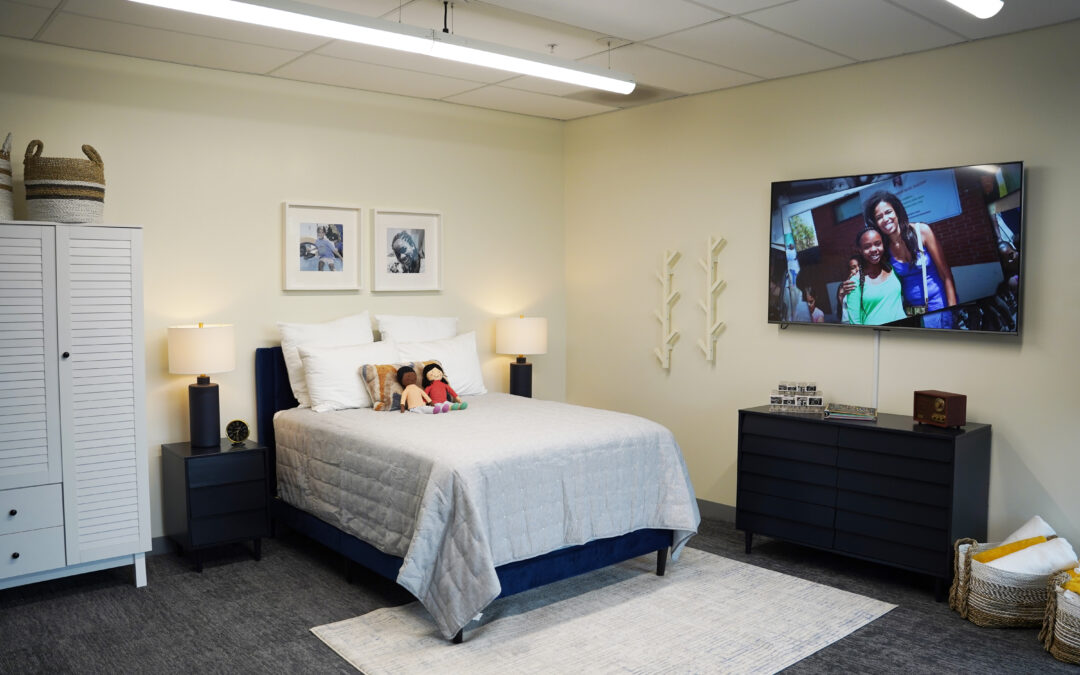Introducing a Research-Informed National Model Designed to Feel Like Home
Los Angeles, CA – In a landmark moment for the Watts/Willowbrook community, today Special Needs Network announced the official opening of the Center for Autism and Developmental Disabilities (C.A.D.D.), a comprehensive and fully integrated developmental and autism center situated within the Martin Luther King, Jr. Medical Campus. This state-of-the-art facility will be unveiled to the public with a special open house event on Thursday, September 28, marking a transformative milestone for the region and setting a new standard for the state and the nation.
“As a mother to a child growing up with special needs, I found myself in countless clinical spaces from Los Angeles to Santa Barbara, and we do not need another sterile clinic,” said Special Needs Network Founder and CEO Areva Martin. “With this center, my hope was to design a space where families could experience a warm, natural environment that would inspire connection and nurture growth while making a meaningful and measurable impact. And the scientific research reinforces that these welcoming spaces designed to model home and hearth are more conducive to positive outcomes.”
Martin’s conception of the project draws on her knowledge of the latest innovations and interventions as the Founder of SNN, her insights as a leader in antiracism work, and her lens as the parent of a child with special needs. She collaborated with the designers at Plana Architects, whose research-informed approach envisions learning environments as places to foster curiosity and connection. Their designs embrace natural light and green spaces and treat furniture as a facilitator of learning and collaboration.
“These rooms feel like living, breathing spaces that invite you in and ground you even as they make you feel part of the world,” said architect and designer Branka Knezevic. “I am so thrilled to be have been a part of this collaboration and envision spaces that support growth and creativity.”
Incorporating Natural Environment Teaching (NET) for Children with Autism
The C.A.D.D. integrates and coordinates services for greater impact than those delivered in a siloed approach. The design underscores the impact of providing a holistic, data-driven approach to developmental care, and one of its key innovations is the integration of Natural Environment Teaching (NET). NET is a method that can help children with autism in several ways. It enables children to grasp a range of concepts such as sitting in different types of chairs in different environments; allows children with ASD to learn and practice skills in multiple settings that are deliberately crafted to mirror real-world situations; and allows the therapy to focus on topics of interest to the child, increasing the likelihood of retaining key skills and behaviors.
Children and young people access support and practice life skills in spaces like a light-filled kitchen where nutritious recipes are tested, a model bedroom where a teen can practice making a bed and folding clothes, and a hip and engaging game room and music center for teens to connect socially and challenge themselves with activities from laying their own music beats to hosting a podcast.
“The research is telling us important, exciting things about the effect physical spaces have on improving social communication, cognition and motivation,” said Arshya Vahabzadeh, M.D., a prominent thinker and leading expert in innovations around autism. A member of the ANN advisory board, Dr. Vahabzadeh provided invaluable consultative services in the development of the clinic. “The C.A.D.D. design embraces that new understanding. It is both intuitive and innovative, and promises to have an enormous impact on children and families and to further our understanding of what works best.”
A Home in Watts/Willowbrook
C.A.D.D. has been strategically positioned to address a profound need in Watts/Willowbrook, where residents have long endured under-resourcing and disparities that have persisted for generations. With a median household income of $25,161 and 2.9% of residents holding a four-year degree, these communities have faced substantial challenges in accessing critical developmental and medical services.
The systemic bias encountered by Black families seeking support for a child with developmental delays has been well documented, including by the Centers for Disease Control and National Institutes of Health. Although the prevalence of ASD has been found to be consistent across racial and ethnic groups, Black, Latino and Asian children and children from low-income families are diagnosed later, missing a critical window for intervention described as “optimal neuroplasty.”
With a focus on anti-racist service delivery combined with community outreach and targeted support for families at the highest risk of encountering roadblocks, C.A.D.D. offers a comprehensive and integrated range of services, many of which are unique to the region. They include diagnosis, early intervention services, transition services for teens and young adults, speech therapy, occupational therapy, physical therapy, and Applied Behavior Analysis therapies. Essential medical and dental care is delivered by St. John’s Well Child and Family Center. Offerings still in development include an Outdoor Wellness Center and Sensory Garden supported by research findings that nature can have a healing effect on autistic children by addressing sensory integration issues.
“We are unveiling more than a center that is transforming lives; we are lighting a beacon of hope,” said Martin. “This center sets the standard for the state and the nation. Watts/Willowbrook and the MLK Campus deserves nothing less.”
The Special Needs Network invites the media, community leaders, and the public to join them on September 28 for an exclusive look at this groundbreaking center, which is poised to transform lives, nurture hope, elevate standards and advance the field of autism and developmental care.
Special Needs Network, Inc. is a nonprofit grassroots organization responding to the crisis of autism and other developmental disabilities in underserved communities. We recognize the intersectionality of individuals with disabilities and that their fight for disability rights is inextricably tied to the fight for racial justice and the civil rights of all people.
